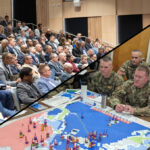The laws of war are a means to build and maintain legitimacy by showing respect for the rule of law and a willingness to follow widely accepted ethical and moral principles.
Alleged violations of international law by Russia in its ongoing war with Ukraine are abhorrent from a human rights perspective, but they also carry significant concerns for the legitimacy of Russia’s military and government. The laws of war are a means to build and maintain legitimacy by showing respect for the rule of law and a willingness to follow widely accepted ethical and moral principles. By conducting military operations in a way that strains compliance with the laws of war, Russia reveals the importance of legitimacy for success in modern conflict. Russia’s lack of legitimacy, and corresponding failure to bring the conflict with Ukraine to an acceptable conclusion, carries implications for military leaders at the strategic and operational level.
Legitimacy as a Concept
Legitimacy, elevated to a foundational principle of war by the U.S. Department of Defense in 2008, is focused on the actual or perceived legality, morality, and rightness of actions by military forces (Department of Defense, Joint Publication 3-0, Joint Campaigns and Operations, June 2022, at A-4). This doctrine likens legitimacy to other mainstay principles like objective (a clearly defined and achievable goal), mass (concentrating military force at the most advantageous place and time), and unity of command (unifying effort under one responsible commander). The purpose behind legitimacy is to maintain legal and moral authority; without it, operations risk failure. Conceptually, legitimacy is built, maintained, and sustained through adherence to international legal standards for the use of force, respect for the rule of law, protection of civilians and civilian infrastructure, and legal diplomacy in the form of official public statements explaining a nation’s view of the law and its application (Complex Battlespaces: The Law of Armed Conflict and the Dynamics of Modern Warfare, at 223-258). Of note, the United States is not the only nation that considers legitimacy of vital importance (Complex Battlespaces at 228-229), and such a consensus can be key to forming coalitions and building cohesion. A lack of legitimacy can have the opposite effect, undermining common effort and support; the 2006 Army and Marine Corps field manual on counterinsurgency explicitly linked legitimacy to operational effectiveness (Complex Battlespaces at 227).
Russian Military Operations and Legitimacy Concerns
Russia has engaged in numerous acts alleged to violate the laws of war in its initial year of conflict with Ukraine. Many of these acts are not clear violations and Russia is attempting to stretch the limits of what the law allows, including the indiscriminate attacks Russia undertook in response to the bombing of the Kerch Strait Bridge in Crimea and the purposeful targeting of Ukrainian electricity production facilities and the transmission grid, which caused concern worldwide. Other Russian military actions appear to have little to no legal justification, including making properly-marked ambulances the subject of attack, the bombing of known hospitals, or the killing (and possible torture) of civilians. Clearly, Russia has committed several actions that either explicitly or implicitly challenge the principles underlying the law of war.
While Russia has prompted numerous allegations of violating international law since its February 2022 invasion of Ukraine, determining the impact on legitimacy, particularly as it is perceived by relevant parties (Joint Publication 3-0 at A-4, A-5), requires a holistic analysis of Russian behavior.
How a nation is held accountable post-conflict is often the clearest measure of legitimacy the world sees. Interestingly, Russia must believe some opinions of the international community are important, given that it continues to provide justifications for how Russian military operations remain in compliance with Russia’s international legal obligations (see here, here, here, here, and here). Starting with the legally questionable justifications of self-defense and humanitarian intervention for the initial invasion, Russia has not simply refused to engage or offer explanations for its actions. This implies Russia sees some benefit to perceptions of legitimacy but may not attach as much importance to the concept as others.
Comparing Russia’s offered justifications to the implicated international legal standards shows that its attempt at legitimacy is a charade. After the Kerch Strait Bridge attack, Russia retaliated by launching dozens of missiles indiscriminately across Ukraine for what Russia viewed as a terrorist attack by Ukrainian Special Services. It is important to note that retaliation or retribution are not recognized as lawful reasons to resort to armed force under international law. Russia’s response is simply a dubious effort to corral military action into existing international law permitting reprisal under limited circumstances. The customary international law of reprisal allows unlawful acts to persuade state actors to stop violating the law (Jean S. Pictet, Geneva Convention Relative to the Protection of Civilian Persons in Time of War: Commentary (International Committee of the Red Cross,1958) at 227). Under U.S. application, such acts must be a last resort, proportionate in nature, and made public as a reprisal. Russia’s explanation appears loosely compliant, but digging deeper shows it is without merit. There has been little evidence that Ukraine violated international law initially, and the Russian response does not appear proportionate. Additionally, Russia remains bound by existing legal obligations to not direct reprisals against civilians and civilian objects.
The same conclusion can be drawn regarding other actions by Russia against Ukrainian people and infrastructure, such as Russia’s attacks against Ukraine’s electrical infrastructure. Ostensibly, it is not unlawful to attack electric grids or production facilities, and arguments can be made justifiably that the strikes comply with the law of armed conflict principles of distinction and proportionality. Electric power stations and transmission grids are sufficiently important to a state’s capacity to make and sustain war efforts for them to be considered valid military objectives. However, the distinction principle prohibits making civilians not directly participating in hostilities the subject of attack, and proportionality requires impacts to the civilian populace not be excessive. It would be reasonable to conclude here that the scope, duration, and intensity of Russia’s attacks make them clearly excessive and thus unlawful. When attacks on electrical capacity occur during winter, apparently to directly impact the civilian populace, legality is stretched to its limit.
Most importantly, the Russian example demonstrates the continued relevance that legitimacy plays as a principle of war. It is not a irrelevant holdover from the counterinsurgency era, where focus on public perception became a strategic necessity to “win hearts and minds.”
Russia has targeted medical hospitals and ambulances, both of which are explicitly protected under the law of war (First Geneva Conventions, Articles 18-21; Articles 12-15 and 21 of Additional Protocol I; and Law of War Manual at 7.10, 7.17, and 7.18); such attacks constitute serious violations of international law. Russia claims it only targets objects of military value, and also claimed that combat positions were present at Ukrainian medical facilities without evidence existing to support this assertion. Even if true, there is no indication Russia provided required warnings (See here, here, and Law of War Manual at 7.10.3.2 and 7.17.1.2). Most concerning is the apparent execution of civilians and the forced deportation of thousands of Ukrainian children to Russia. While Russia made no official statement regarding civilians tortured and killed in Bucha, a recent Yale University Humanitarian Research Lab report shows Russia provided questionable legal claims (evacuation of orphans, consent of parents/guardians, or medical care) to justify removing children. Regardless of the proffered explanation, these forced movements of children appear to constitute a grave instance of child abduction during armed conflict.
The Effects of Legitimacy on Russia’s Military Campaign
As a result of these actions, Russia has faced not only intense outcry from the international community and news media, but also sanctions, investigations, and various forms of direct support to Ukraine in response. Sanctions implemented by both the United States and other nations have targeted finance, energy, and military technology. Various entities opened investigations into Russia actions, both for the initial invasion and in alleged violations of the law of war. In a recent dramatic announcement, the International Criminal Court (ICC) issued an arrest warrant for President Vladimir Putin for alleged child abduction war crimes. Additionally, Ukraine has received billions of dollars in support from allies. Nothing has halted the armed conflict, but Russia’s standing in the world certainly has diminished and its ability to continue to prosecute the war is predicted to steadily decline. While Russia defied initial expectations regarding the impact of sanctions, time is not on its side, especially considering the increased likelihood of internal public discontent. The above signals a clear truth: Russia’s lack of legitimacy in the conduct of its military operations in Ukraine has been, and will continue to be, determinative of Russia’s coinciding lack of strategic and operational success in its ongoing military campaign.
Lessons for the U.S. Military
Lessons drawn from the above analysis reveal the continued importance of legitimacy in military operations, both before and during armed conflict. Russia’s actions in Ukraine earned the nation pariah status, which will ultimately be disastrous for accomplishing its military objectives and could also have real long-term economic impact. The relevance to U.S. military leaders at all echelons is twofold. First are the real-world consequences at an individual level. A lack of legitimacy in Russia’s case motivated the international community to seek accountability. If Russia’s head of state can be indicted by the ICC for actions directed on the battlefield, certainly U.S. military commanders at all levels are susceptible to similar repercussions for overstepping the law of war, albeit in a slightly different forum since the United States has not ratified the Rome Statute.
Second, at a strategic and operational level, reduced legitimacy can impact the effectiveness of U.S. military operations. This could take the form of failed coalitions, reduced logistical or financial support (including appropriations from Congress), and even sanctions of some form, as we have seen with Russia. Also significant are the second and third order effects outside of the military context, such as a lack of stability, social order, and a nation’s ability to provide for its citizens in accordance with the modern social contract. Russia’s internal battle against dissent signals the reality of such a proposition. In a future conflict environment, support of partners, allies, and civilian populations is vital; conversely, a legitimacy deficit could be disastrous.
Most importantly, the Russian example demonstrates the continued relevance that legitimacy plays as a principle of war. It is not an irrelevant holdover from the counterinsurgency era, where focus on public perception became a strategic necessity to “win hearts and minds.” (Complex Battlespaces at 228). As the scale of conflict increases, so too does the specific elements of concern legitimacy can address, magnified in both importance and complexity. Winning in the complex, modern multi-domain battlespace requires more than just fielding the most powerful weapons, the fastest aircraft, or most capable soldiers (Complex Battlespaces at 224). The moral high ground is just as important as its physical counterpart. Ukraine has thus far stymied Russian success on the battlefield due in large part to Russia’s yielding legal and moral authority through its choice to operate with legal ambiguity, or in outright contradiction to what is right. That lesson must be learned and remembered by U.S military leaders in their preparation for future conflict. As former U.S. Department of State Legal Advisor Brian Egan also emphasized, legitimacy, facilitated by adherence to the law of armed conflict, must remain a focal point for the United States if it is to continue to be a beacon for what is fundamentally right in the world.
MAJ Justin MacDonald is an Associate Professor in the National Security Law Department at The Judge Advocate General’s Legal Center and School. MAJ MacDonald most recently served as the Chief of National Security Law for U.S. Forces Afghanistan and the Defense Security Cooperation Management Office–Afghanistan. He has also served as legal advisor to special operations units both domestically and abroad.
The views expressed in this article are those of the author and do not necessarily reflect those of the U.S. Army War College, the U.S. Army, or the Department of Defense.
Photo Description: Volodymyr Zelenskyy visits Bucha, Kyiv Oblast, Ukraine where he talked to local residents and journalists. On 8 August 2022, officials released a count of civilian deaths in the town of Bucha alone: 458 bodies—419 with signs of shooting, torture, or violent trauma—and 39 of apparently natural causes but being scrutinized for their relationship to the Russian occupation.
Photo Credit: Courtesy of Rawpixel, Public Domain





I understand that you believe that the war against Russia by the USA in favor of Zelenski’s government is legitimate. I respect your opinion, but I would like to offer a different perspective.
I believe that the US military is often focused on short-term goals and objectives, and that this can sometimes lead them to overlook the larger picture. For example, the US military may be focused on defeating Russia in the short term, but this may not be in the best interests of the people of the United States in the long term.
I also believe that the US military is often manipulated by its unethical civilian and military leadership. This can be seen in the way that the military has been used to support the interests of multinational corporations, which have the Military Industrial Complex as a means to achieve their objectives.
Furthermore, the Military Industrial Complex has been a powerful entity in its own right. This complex has been responsible for many wars, and it has often profited from these wars. I believe that it is important to be aware of the role that the Military Industrial Complex plays in wars, and to be critical of its motives. The technological progress in human society is such that the reasons for war have been less every time in time, and a positive peace where mutual benefit has become more likely.
The Military Industrial Complex has also been involved in the war in Ukraine through its support of multinational corporations that have interests in the region. For example, the Yamal pipeline, which transports natural gas from Russia to Europe, is owned by a consortium of European and Russian companies. Burisma Holdings, a Ukrainian natural gas company, has been involved in corruption allegations involving Hunter Biden, the son of former US Vice President Joe Biden. These corporations have a vested interest in controlling the natural gas supply into Europe, and they may be using the war in Ukraine to further their own interests.
I also believe that the war in Ukraine is not as simple as it seems. There are many factors that have contributed to the war, and it is important to understand all of these factors before making a judgment about the legitimacy of the war. The war has had a devastating impact on the people of Ukraine, and it is important to remember the human cost of the war. The war is also having a significant impact on the global economy, and it is important to consider the long-term consequences of the war.
I hope that you will consider my perspective. I believe that it is important to have a thoughtful and informed discussion about the war in Ukraine. I believe that war is stopping being the answer, and that there are always peaceful solutions to conflict. I hope that one day, we will live in a world where war is obsolete and defeat war.
Mr. Mendoza:
I believe that the legitimacy (or not) of Putin’s war in Ukraine, this is not what is being discussed/this is not the main topic of our article above.
Rather, what would seem to be being discussed/what would seem to be the main topic of our article above, this is whether there is a lesson to be learned — by the U.S./the West and others — regarding (a) Putin’s “war abuses,” (b) his violations of international law and (c) his loss of legitimacy (if this, in fact, is true) because of this.
Accordingly, as to those specific such matters (see my paragraph immediately above), what are your thoughts?
We stand with Ukraine.